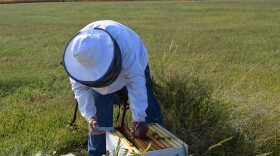Delaware has a new chief bee inspector who will work to keep the state’s Pollinator Protection Plan up to par with national standards.
State Apiarist Meghan McConnell said there are three important things beekeepers should note: pathogens, poor nutrition and pesticides.
“If we can communicate between the growers and the beekeepers to possibly put in some of these pollinator buffers, maybe that will help with some of the poor nutrition,” McConnell said. “And then if we’re able to communicate with pesticide applicators that kind of eliminates that pesticide risk.”
Each state created a pollinator protection plan under former president Barack Obama to promote bee health. Delaware’s final plan was unveiled in December 2016 and it outlines the resources and practices beekeepers can use to protect bees and other pollinators.
Faith Kuehn, the plant industries administrator for Delaware’s Department of Agriculture, said the plan serves as guidelines to advise beekeepers and farmers. Kuehn said the state seems to have a lot of interest in bees and how bees can help farms.
“There probably isn’t a sector that bees and bee health doesn’t touch,” Kuehn said.
Last year, Delaware began using BeeCheck - an app that encourages communication between beekeepers and pesticide applicators.
Delaware's Department of Agriculture said when they rolled out the protection plan, there were only 15 users of BeeCheck in 22 sites. Now, 82 users have registered in 55 locations. McConnell said she’ll play a role in helping to promote the use of the app.
“It takes an entire community for a bee colony to survive,” McConnell said. “…You have the queen, you have her workers, you have the male drones. It really kind of is an example for us that it takes an entire community for us to be the best we can be.”
McConnell graduated from University of Maryland in 2012 with a degree in Environmental Science & Technology. She recently finished her masters in Entomology.
Five years ago, she interned at the U.S. Department of Agriculture’s Natural Resources Conservation Service lab in Maryland and she worked in their pollinator garden. She realized then, that she was interested in pollinators. Later, she worked in a honeybee lab at University of Maryland.
“I think my favorite thing that I love to tell kids when I talk about bees is that they have five eyes,” she said. “But, they’re just fascinating creatures…”
According to the Department of Agriculture, there are more than 1,500 registered hives in the state as of December 2016.



